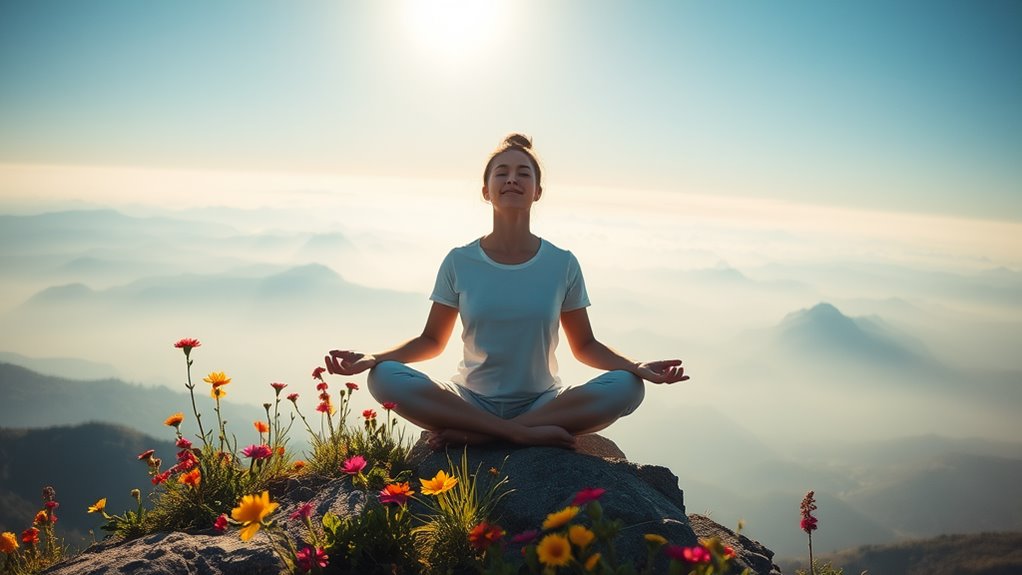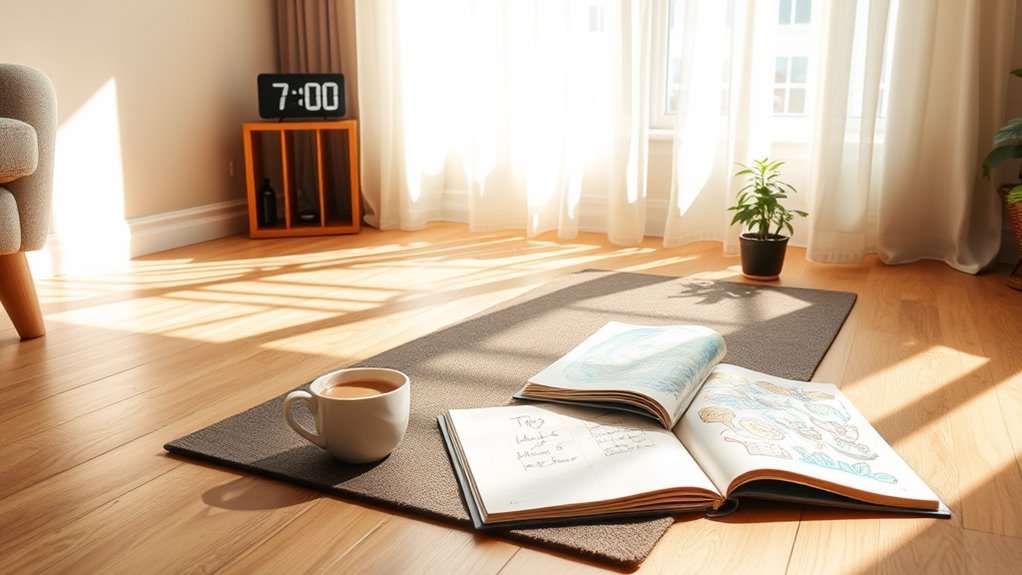Why Meditation Is the Key to Unlocking Your Full Potential
Meditation’s your gateway to accessing full potential. It sharpens mental clarity, enhances emotional regulation, and builds resilience, allowing you to handle life’s challenges with composure. By focusing on your breath, you ground yourself in the present, cultivate creativity, and increase self-awareness. This practice fosters deeper empathy, improving your relationships and understanding of others. As you embrace meditation, you’ll discover transformative benefits that elevate your well-being and growth—there’s so much more to explore.
Key Takeaways
- Meditation enhances emotional regulation, allowing for thoughtful responses rather than reactions, promoting personal growth and resilience.
- Regular practice increases neural connectivity, boosting memory, learning, and overall cognitive function essential for reaching full potential.
- Mindful breathing sharpen focus and clarity, enabling creativity and effective decision-making in personal and professional life.
- It fosters self-awareness by transforming emotional experiences, supporting informed decisions that align with one’s authentic path.
- Meditation cultivates empathy, enhancing relationships and communication, which are vital for both personal and collective growth.
The Science Behind Meditation and Its Impact on the Brain
As you explore the science behind meditation, you’ll find compelling evidence that it greatly alters brain function and structure.
Research shows that consistent meditation practice enhances neural connectivity, particularly in areas linked to emotional regulation and self-awareness. By focusing on your breath during meditation, you activate the parasympathetic nervous system, promoting relaxation and reducing stress levels. This deep breathing not only calms the mind but also encourages the brain’s gray matter to grow. Furthermore, studies reveal that meditation increases the size of the hippocampus, a vital area for memory and learning.
Incorporating regular breathing exercises into your practice can further amplify these benefits, allowing for more profound stress relief and enhanced focus. As you refine your breathing techniques, you’ll access greater potential for cognitive resilience and emotional intelligence, essential components in mastering your inner landscape and achieving personal success.
Enhancing Mental Clarity Through Focused Breathing
When you practice focused breathing, you’ll find that it greatly enhances your mental clarity. By concentrating specifically on your breath, you ground yourself in the present moment, eliminating distractions that cloud your thinking.
As you inhale deeply, envision energy filling your mind; as you exhale, release lingering doubts and confusion. This rhythmic practice sharpens your focus, allowing insights to surface effortlessly.
You’ll notice improved decision-making and creativity, as your mind attains a heightened state of awareness. Each session cultivates a precise mental lens, empowering you to tackle challenges with renewed vigor. Additionally, incorporating breathing techniques can further amplify your overall relaxation and mindfulness.
As you integrate focused breathing into your daily routine, you open the door to higher levels of cognitive functioning, amplifying your overall potential in both personal and professional domains.
Stress Reduction Techniques for a Balanced Life
Building on improved mental clarity from focused breathing, incorporating stress reduction techniques can further enhance your overall well-being.
These methods not only relieve tension but also foster resilience against daily pressures. Here are three impactful techniques you can integrate into your routine:
-
Mindful Movement: Engage in activities like yoga or tai chi to connect your body and mind, promoting relaxation and focus.
-
Progressive Muscle Relaxation: Tense and relax different muscle groups to release built-up stress, helping you become more aware of bodily sensations.
-
Visualization: Create vivid mental images of calming environments, which can transport you away from stressors and cultivate serenity.
In addition, utilizing effective breathing techniques can serve as a foundational practice to further support your mindfulness journey.
Unlocking Creativity With Mindfulness Practices
Releasing your creativity starts with sharpening your focus through mindfulness practices.
By incorporating meditation into your routine, you can expand your imagination and open up new pathways for ideas. Mindful breathing can significantly enhance your meditation experience by helping you stay present and centered.
Let’s explore how these techniques can enhance your creative potential.
Enhancing Focus Through Mindfulness
Although distractions abound in today’s fast-paced world, mindfulness offers a powerful tool for enhancing focus and releasing creativity. By integrating mindful practices into your daily routine, you can sharpen your concentration and access your inner creativity.
Here are three strategies to enhance your focus through mindfulness:
-
Mindful Breathing: Take a few moments to focus solely on your breath, observing each inhalation and exhalation. This anchors your mind and brings clarity.
-
Single-Tasking: Embrace doing one task at a time with full attention. This fosters deeper engagement and minimizes distractions.
-
Body Scan: Regularly perform a body scan meditation, tuning into physical sensations which can ground you and enhance your present awareness.
Adopting these practices will elevate your focus and reveal your creative potential.
Expanding Imagination With Meditation
Once you’ve enhanced your focus through mindfulness, you can start expanding your imagination and tapping into your creative potential.
Meditation allows you to quiet the mind, creating space for innovative thoughts to emerge. As you practice, visualize vivid scenarios and explore uncharted ideas without judgment. Allow your mind to wander freely during sessions; this is where real creativity flourishes.
Incorporate techniques like guided imagery or mantra-based meditation to stimulate different aspects of your imagination. Challenge yourself with creative prompts post-meditation, harnessing that newfound clarity to develop concepts further.
The more you engage with these practices, the deeper your creative reservoir becomes. Embrace this journey, and watch as your imagination opens doors to extraordinary possibilities.
Building Resilience: How Meditation Strengthens Your Mind
Meditation can be a powerful tool in building resilience, helping you enhance your emotional stability.
As you practice, you’ll notice a reduction in your stress response, allowing you to handle challenges more effectively.
This process fosters a positive mindset that empowers you to thrive in difficult situations. Incorporating breathing techniques into your meditation routine can further amplify these benefits, enhancing your overall sense of calm and focus.
Enhancing Emotional Stability
Emotional stability is essential for managing life’s ups and downs, and building resilience can greatly enhance your mental well-being. By incorporating meditation into your daily routine, you cultivate a stronger emotional foundation. This practice empowers you to:
-
Develop self-awareness: You’ll recognize your emotional triggers and respond with clarity rather than impulsivity.
-
Foster empathy: Meditation nurtures empathy, allowing you to connect more deeply with others and maintain healthier relationships.
-
Enhance patience: Regular practice instills a sense of calm, enabling you to approach challenges with patience and composure.
As you deepen your meditation practice, you’ll find that resilience becomes your ally during turbulent times, transforming how you navigate emotional stability and ultimately revealing your full potential.
Reducing Stress Response
When faced with daily stressors, your body’s natural response can trigger a cascade of tension and anxiety.
Meditation disrupts this cycle, enabling you to regain control. By intentionally focusing your mind, you signal your body to relax, reducing the production of stress hormones like cortisol.
As you practice meditation regularly, you’re not only cultivating a state of calm but also strengthening your resilience against future stressors.
This resilience becomes an essential asset, empowering you to navigate challenges with clarity and composure.
With each session, your mind grows more adept at facing adversity, transforming stress from a debilitating force into a manageable aspect of life.
Embrace meditation, and watch as your ability to confront stress evolves into a powerful tool for mastery.
Fostering Positive Mindset
While life’s challenges are inevitable, cultivating a positive mindset through meditation can empower you to respond with resilience.
Regular meditation helps you reframe your thoughts, enabling you to tackle setbacks with confidence. By strengthening your mental fortitude, you can access your full potential and navigate life’s storms gracefully.
Consider these transformative benefits of meditation:
-
Enhanced Self-Awareness****: Cultivate a deeper understanding of your emotions and thought patterns.
-
Improved Emotional Regulation****: Develop the ability to manage stress and remain calm under pressure.
-
Increased Optimism: Foster a hopeful outlook, encouraging proactive responses to difficulties.
Embracing meditation as a tool for fostering a positive mindset paves the way for mastery over your internal landscape.
The Role of Meditation in Emotional Regulation
Meditation plays an essential role in helping you navigate your emotions. By regularly practicing mindfulness, you enhance your ability to observe your thoughts and feelings without judgment.
This observation allows you to break the automatic response patterns that often lead to emotional overwhelm. You’ll start recognizing triggers and can choose how to respond, rather than simply reacting.
Embracing meditation cultivates a calmer mind, which directly influences your emotional state. As you deepen your practice, you learn to accept emotions as they arise, transforming how you experience both positive and negative feelings.
Ultimately, meditation empowers you to regulate emotions effectively, fostering resilience and clarity in challenging moments, thereby revealing your full potential in both personal and professional domains.
Developing Patience and Persistence Through Regular Practice
Practicing meditation regularly helps you build mental resilience, making it easier to face life’s challenges.
As you develop patience, you’ll notice greater emotional stability in difficult situations. This steady foundation empowers you to persist in your goals, even when obstacles arise.
Building Mental Resilience
As you immerse yourself in meditation, you naturally start to cultivate mental resilience, which is essential for developing patience and persistence.
Regular meditation practice strengthens your mind, helping you navigate life’s challenges with greater ease. You’ll find that your focus sharpens, distractions diminish, and your ability to endure difficult situations improves markedly.
To enhance your mental resilience, consider the following:
- Commit to Consistency: Establish a routine to reinforce your meditation practice.
- Embrace Discomfort: Use meditation to face and accept discomfort rather than shy away from it.
- Reflect and Adapt: Regularly evaluate your thoughts and reactions, using meditation as a tool for growth.
Enhancing Emotional Stability
While traversing life’s emotional ups and downs, enhancing your emotional stability can make a significant difference in how you respond to challenges.
Regular meditation cultivates patience and persistence, essential traits for mastering life’s demands. By establishing a daily practice, you train your mind to remain centered amid chaos, transforming reactive tendencies into thoughtful responses.
As you meditate, you’ll learn to observe your thoughts and emotions without judgment, fostering resilience. This awareness allows you to confront difficulties with newfound clarity, enabling you to approach situations calmly and constructively.
Over time, you’ll notice a shift in your emotional landscape, where setbacks become opportunities for growth. Embrace this journey, and watch your emotional stability reveal your true potential.
Meditation as a Tool for Personal Growth and Self-Discovery
Meditation serves as a powerful catalyst for personal growth and self-discovery, inviting you to explore the depths of your inner landscape.
By committing to a consistent practice, you’ll uncover insights that can transform your life. Here’s how meditation fosters your development:
-
Increased Self-Awareness: You’ll gain clarity about your thoughts, emotions, and behaviors, empowering you to make informed choices.
-
Enhanced Intuition: As you quiet the mind, you’ll tap into your intuition, guiding you toward your authentic path.
-
Resilience Building: Regular meditation strengthens your mental resilience, enabling you to navigate life’s challenges with grace and confidence.
Ultimately, as you deepen your practice, you’ll cultivate a profound understanding of yourself, paving the way for continuous growth and achievement.
Transforming Relationships Through Increased Empathy
When you practice meditation regularly, you not only deepen your connection with yourself but also enhance your ability to empathize with others.
This heightened empathy transforms your relationships, allowing you to truly understand others’ perspectives and emotions. As you develop an acute awareness of your thoughts and feelings during meditation, that awareness extends beyond yourself.
You start to recognize subtle cues in conversations, fostering deeper connections. By cultivating compassion through meditation, you bond with others on a level that transcends mere words.
This deepened emotional awareness not only enriches your relationships but also creates a supportive environment where mutual understanding thrives.
Ultimately, the empathy gained through meditation empowers you to navigate conflicts with grace and forge lasting connections.
Practical Steps to Incorporate Meditation Into Your Daily Life
Incorporating meditation into your daily life can seem intimidating at first, but it’s all about finding manageable steps that work for you.
Start by setting aside just five minutes each day, progressively increasing the duration as you become more comfortable.
Here are some practical steps you can take:
-
Create a Sacred Space: Designate a quiet area free from distractions to enhance your focus.
-
Choose a Guided Meditation: Utilize apps or online resources that provide structured sessions, helping you stay on track.
-
Integrate Mindfulness: Remember to incorporate mindfulness into daily activities, like breathing deeply while you walk or eat.
Frequently Asked Questions
How Long Should I Meditate Daily to See Results?
To see meaningful results, aim for at least 10 to 20 minutes of meditation daily. Consistency matters, so establish a routine that suits you, and gradually increase the duration as you become more comfortable.
Can Meditation Help With Physical Health Issues?
Yes, meditation can greatly improve your physical health. It reduces stress, lowers blood pressure, and enhances your immune system. By incorporating it into your daily routine, you’ll notice remarkable changes over time.
What Type of Meditation Is Best for Beginners?
For beginners, mindfulness meditation’s ideal. It focuses on your breath and present moment, helping you cultivate awareness. Start with short sessions, gradually increasing duration as you deepen your practice and gain confidence in your skills.
Is It Normal to Feel Restless While Meditating?
It’s completely normal to feel restless while meditating. Your mind’s racing thoughts reflect your busy life. Embrace this discomfort; it’s part of the practice. Over time, you’ll learn to settle and focus more effectively.
How Can I Maintain a Consistent Meditation Practice?
To maintain a consistent meditation practice, set a regular schedule, create a dedicated space, and start with short sessions. Gradually increase the time as you get comfortable, and stay patient with your progress.





